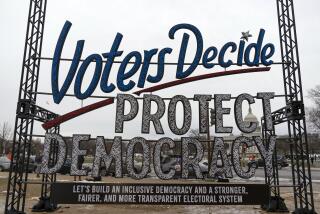If the extremist label fits
Army Maj. Nidal Malik Hasan demonstrated many things when he allegedly committed treason in the war on terror. For starters, he showed -- gratuitously alas -- that evil is still thriving.
He demonstrated that being a trained psychiatrist provides no immunity to ancient hatreds and religious fanaticism, nor does psychiatric training provide much acuity in spotting such things in others. For example, the London Telegraph reports that, in what was supposed to be a medical lecture, Hassan instead gave an hourlong briefing on the Koran, explaining to colleagues at Walter Reed Army Medical Center that nonbelievers should be beheaded, have boiling oil poured down their throats and set on fire.
His fellow psychiatrists completely missed this “red flag” -- a suddenly popular euphemism for incandescently obvious evidence this man had no place in the U.S. Army.
He proved how lacking our domestic security system is. According to ABC News, intelligence agencies were aware for months that Hasan had tried to contact Al Qaeda. His colleagues reportedly knew he sympathized with suicide bombings and attacks on U.S. troops abroad, and one colleague said Hasan was pleased by an attack on an Army recruiting office and suggested more of the same might be desirable. That’s treason, even if you’re a Muslim.
Which raises the most troubling revelation: For a very large number of people, the idea that he is a Muslim fanatic, motivated by other Muslim fanatics, was -- at least initially -- too terrible to contemplate. How else to explain the reflexive insistence after the attack that the real culprit was “post-traumatic stress disorder”? The fact that PTSD is usually diagnosed in people who’ve been through trauma (hence the word “post”), and that Hasan had never in fact seen combat, didn’t seem to matter much.
Apparently the “P” in PTSD can now stand for “pre.”
A few months ago, an anti-Semitic old nut named James von Brunn allegedly took a gun to the U.S. Holocaust Memorial Museum to get payback against “the Jews” and killed a black security guard in the process.
In response to this horrific crime, the leading lights of American liberalism knew who was to blame: Glenn Beck, Rush Limbaugh and the GOP. One writer for the Huffington Post put it succinctly: “Thank you very much Karl Rove and your minions.”
The fact that Von Brunn was a 9/11 “truther” who railed against capitalism, neocons and the Bush administration didn’t matter. Nor did the glaring lack of evidence that Rove et al ever showed antipathy for the museum. It was simply obvious that Von Brunn was the offspring of the “right-wing extremism [that] is being systematically fed by the conservative media and political establishment,” wrote columnist Paul Krugman.
If only Hasan was a fan of Glenn Beck!
President Obama was right when he said, in the early hours after the shooting, that people shouldn’t “jump to conclusions” (a lesson he might have learned when he jumped to the wrong conclusion about a white cop who arrested Henry Louis Gates, a black Harvard professor). But just as we should not jump to conclusions, we shouldn’t jump away from them.
Despite reports that Hasan had shouted “Allahu Akbar” as he opened fire, MSNBC’s Chris Matthews insisted that “we may never know if religion was a factor at Ft. Hood.” Thursday night, NBC and CBS refrained from even reporting the man’s name. Meanwhile, ABC’s Martha Raddatz’s reporting on the subject reflected a yearning for denial: “As for the suspect, Nadal Hasan, as one officer’s wife told me, ‘I wish his name was Smith.’ ”
We have a real problem when much of the political and journalistic establishment is eager to jump to the conclusion that peaceful political opponents are in league with violent extremists, but is terrified to consider the possibility that violent extremists really are violent extremists if doing so means calling attention to the fact that they are Muslims.
I am more sympathetic toward this reluctance to state the truth of the matter than some of my colleagues on the right. There is a powerful case to be made that Islamic extremism is not some fringe phenomena but part of the mainstream of Islamic life around the world. And yet, to work from that assumption might make the assumption all the more self-fulfilling. If we act as if “Islam is the problem,” as some say, we will guarantee that Islam will become the problem. But outright denial, like we are seeing today, is surely not the beginning of wisdom either.
I have no remedy for the challenge we face. But I do take some solace in George Orwell’s observation that “to see what is in front of one’s nose needs a constant struggle.”
More to Read
Sign up for Essential California
The most important California stories and recommendations in your inbox every morning.
You may occasionally receive promotional content from the Los Angeles Times.











